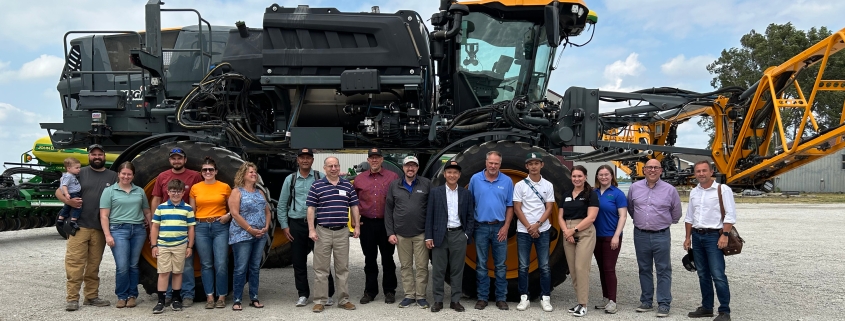SSGA event creates solid links of a chain
Events like SSGA’s Fork to Farm help create solid links between everyone involved with the U.S. identity preserved field crop industry: From a crop’s start at the farm, to the processor and across the globe to the plate and fork of a consumer.
Illinois Soybean Association (ISA) was the host for the June 26 event, which included briefings from ISA, SSGA and Clarkson Grain Company, lunch and soy food samples from Jenny’s Tofu/Phoenix Bean and a farm tour. In attendance were growers, soy food manufacturers from Myanmar and Cambodia and exporters of U.S. Identity Preserved crops: Hang Tung Resources, WeFARM Organics, Clarkson Grain Company and Scoular.
The international soy food manufacturers were part of a trade team sponsored by the American Soybean Association’s World Initiative for Soy in Human Health (WISHH) program. The trade team joined the event after completing a Food Grade Soybean Procurement course at Northern Crops Institute a few days before.
Discussions were held about soybeans grown in Illinois and their efficiency, quality and sustainability, as well as U.S. Identity Preserved field crops and the traceability these crops offer. Attendees from all parts of the industry agreed that traceability will continue to be important to consumers.
“We’re talking about tofu today, but in the future, we’re going to have to provide the traceability for livestock feed. It’s coming,” said Rob Prather, SSGA Director and COO of WeFARM Organics.
“I believe I’m doing a good job at providing what the consumer wants, so I’m in favor of providing traceability,” said Bryan Severs, a grower and ISA Director. “We might as well be ahead of it. I know my son and other farmers in his generation will need to take the extra steps to grow a traceable crop. It’ll be second nature for the next generation to provide that traceability.”
Attendees sampled soy foods made by Jenny Yang of Phoenix Bean/Jenny’s Tofu. Yang served samples of her soy foods, including various flavors of tofu, tofu dip, soy protein noodles, soy milk and tofu puffs.
Like her Taiwanese culture, Yang pays close attention to the quality of her ingredients, purchasing only identity preserved, non-GMO soybeans grown in Illinois. By using identity preserved soybeans with a higher protein content, Yang can create products that are ideal for tofu making. The higher protein soybeans yield a higher amount of tofu that shrinks less after cooking, leading to a more efficient product.
Yang’s products are available for purchase at Chicago area farmers markets and retailers such as Whole Foods.
Drew Whalen from Clarkson Grain Company stressed the importance for customers to state their interest in U.S. Identity Preserved crops early. It can take 18 months or more for an identity preserved crop to be delivered after the initial discussion with a customer about their specific product needs, such as hilum color, protein level, sugar or sucrose level.
In those 18 months, an exporter such as Clarkson Grain Company will discuss the needs and prepare a contract with their international customer. Then, they’ll find a grower able to plant and grow that identity preserved crop. Sometimes it is difficult to find a grower that will undergo the risk and adversities, such as fewer weed control options, of growing an identity preserved crop.
Despite the challenges with growing a U.S. Identity Preserved crop, growers are proud to know exactly where a product that they grew ends up.
“There’s something different about a food-grade farmer and the pride they have in growing an IP crop,” said Brett Blaser from Scoular. “Many farmers and their dads, grandparents, all did the same thing and grew the same product. But a non-GMO farmer strayed away from the beaten path of what their family did and grew an identity preserved crop. They want to prove that they can do it.”
Fork to Farm attendees were able to experience some of this pride firsthand on the tour of Severs’ farm near Potomac, Ill. Severs showed off his farm and equipment, and discussed things he does to ensure that the seed that he plants in his soil ends up as quality, healthy food on a customer’s table.







Leave a Reply
Want to join the discussion?Feel free to contribute!